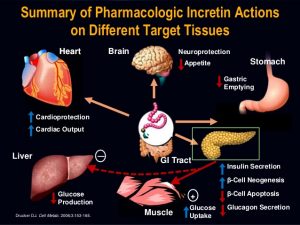
Here’s the bottom line. The Incretin hormones Glucagon-Like Peptide-1 (GLP-1) and Gastric inhibitory polypeptide (GIP) are secreted by cells in the intestinal tract in response to what we eat. Fat stimulates them much more strongly than protein or carbohydrate and they do all kinds of good things like:
- Decrease our appetite by causing increased Leptin secretion
- Decrease our appetite by slowing gut motility
- Protects the Insulin producing “Beta Cells” in the Pancreas and even encourages new ones to be born if they are damaged.
- Blocks the excess Glucagon release seen in people with the Metabolic Syndrome and Diabetes which helps shut down harmful excess glucose production in the Liver.
- Increases blood flow and nutrient uptake in the Heart
- Protection of the Brain. “This article summarizes the evidence for neuronal activity of GLP-1 and examines the limited data that currently exist on the therapeutic potential of GLP-1 in specific neurological and neurodegenerative conditions, namely Alzheimer’s disease, Parkinson’s disease, Huntington’s disease, stroke and peripheral sensory neuropathy.”
- Reduce the risk of Alzheimer’s Disease.
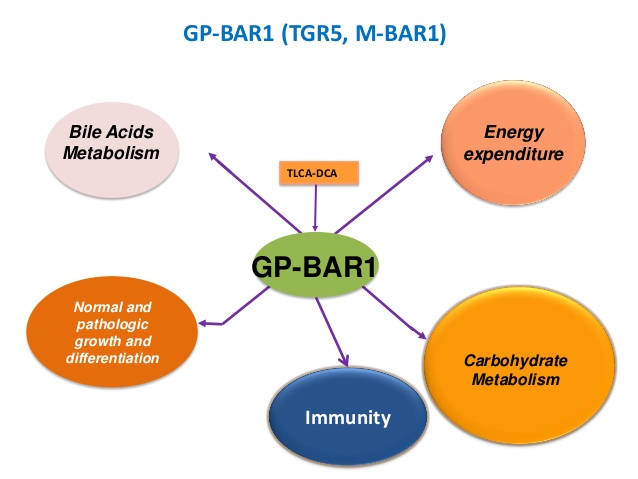
Also a new receptor in the gut called the G Protein-coupled Bile Acid Receptor (GPBAR-1) has been recently discovered. This receptor senses the release of bile acids from the gall bladder. When it is stimulated more of the thyroid hormone T4 is converted to the active form T3 which increases the body’s metabolic rate aiding weight loss.
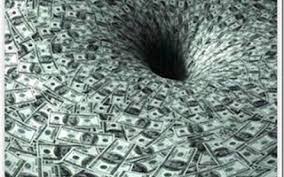 “The pharmaceutical industry has certainly figured out how beneficial medicines that stimulate the Incretins (GLP-1 and GIP) and how lucrative medicine that stimulate GPBAR-1 receptors could be and they have been quick to flood the market with Incretin based medications and are feverishly working on medicines that stimulate GPBAR-1 receptors. This is big business, Americans spend seven and a half BILLION dollars on the top 10 diabetes medicines per year. 3 of them work by increasing incretins (Januvia, Victoza and Janumet) the other 7 are all various forms of insulin. And of course insulin in the long run just makes diabetes get worse as Dr. Fung explains in this short video.
“The pharmaceutical industry has certainly figured out how beneficial medicines that stimulate the Incretins (GLP-1 and GIP) and how lucrative medicine that stimulate GPBAR-1 receptors could be and they have been quick to flood the market with Incretin based medications and are feverishly working on medicines that stimulate GPBAR-1 receptors. This is big business, Americans spend seven and a half BILLION dollars on the top 10 diabetes medicines per year. 3 of them work by increasing incretins (Januvia, Victoza and Janumet) the other 7 are all various forms of insulin. And of course insulin in the long run just makes diabetes get worse as Dr. Fung explains in this short video.
Here’s a slide from a presentation to doctors about the new Incretin drugs encouraging them to use them more and earlier which isn’t a bad idea but wouldn’t it be better to do it naturally by simply upping the fat in the diet and lowering the carbs.
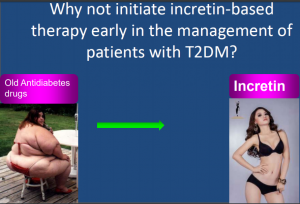
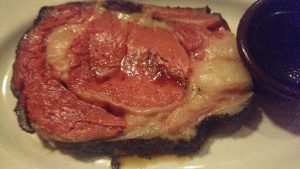 Eating fat increases the Incretins GLP-1 and GIP in 2 different ways. We have Free Fatty Acid Receptors (FFARs) which detect the fat we eat throughout our gut. GLP-1 is secreted from L-Cells. When Free Fatty Acid Receptor cells detect fat they stimulate the release of GLP-1 as this article shows. The more fat you eat the more bile is secreted from your gall bladder to help digest the fat. It turns out that bile also stimulates the release of GLP-1 from L-cells. Here’s a quote from this article: “Bile acids are well-recognized stimuli of glucagon-like peptide-1 (GLP-1) secretion.”
Eating fat increases the Incretins GLP-1 and GIP in 2 different ways. We have Free Fatty Acid Receptors (FFARs) which detect the fat we eat throughout our gut. GLP-1 is secreted from L-Cells. When Free Fatty Acid Receptor cells detect fat they stimulate the release of GLP-1 as this article shows. The more fat you eat the more bile is secreted from your gall bladder to help digest the fat. It turns out that bile also stimulates the release of GLP-1 from L-cells. Here’s a quote from this article: “Bile acids are well-recognized stimuli of glucagon-like peptide-1 (GLP-1) secretion.”
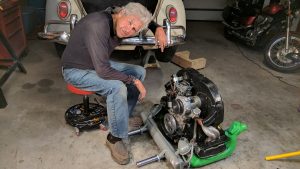 So if you have the Metabolic Syndrome with obesity, high blood pressure and high blood triglycerides you are definitely on the way to diabetes. Time to get off that train and one of the best ways to do that is to eat a lot more fat. Here’s why I think animal fats are superior to plant fats in that regard. And if you think that a high fat diet is going to give you a heart attack, that discredited theory has been shown to have no basis in science in books like Nina Teicholz tour de force “The Big Fat Surprise”. Heart attacks are caused by sugar and/or tobacco use. I reviewed the evidence for that in this post. So stop fearing fat, it’s one of the best things you can put in your mouth.
So if you have the Metabolic Syndrome with obesity, high blood pressure and high blood triglycerides you are definitely on the way to diabetes. Time to get off that train and one of the best ways to do that is to eat a lot more fat. Here’s why I think animal fats are superior to plant fats in that regard. And if you think that a high fat diet is going to give you a heart attack, that discredited theory has been shown to have no basis in science in books like Nina Teicholz tour de force “The Big Fat Surprise”. Heart attacks are caused by sugar and/or tobacco use. I reviewed the evidence for that in this post. So stop fearing fat, it’s one of the best things you can put in your mouth.
If you would like to discuss this further or have other data, please join my Facebook Group “Zero Carb Doc”, email me at ZeroCarbDoc@gmail.com or comment on this post.
If you missed my last post called “New Study! – The Metabolic Syndrome can be reversed by a Low Carb, High Fat diet” you can view it by CLICKING HERE.
When is the best time to use ACV? After a meal? On an empty stomach? Beginning or end of the day? Do the pills offer the same benefits as liquid?
Vinegar is primarily composed of acetic acid which is the shortest possible short chain fatty acid but still a fatty acid and it has been show to stimulate Free Fatty Acid Receptors (FFARs). This in turn will lead to GLP-1 and GIP release with all the benefits of those hormones noted in the post. Here’s a study that shows how vinegar can improve insulin sensitivity after taking just a little more than an ounce (40g). http://care.diabetesjournals.org/content/27/1/281.long An ounce of ACV has just 6 calories. I believe that people who do intermittent fasting shouldn’t consume significant calories outside the eating window. That having been said many experts in the field like Jason Fung do not feel that a cup of bouillon here and there during the fasting period is not a problem. The average cup of Bouillon has about 5 calories so an ounce of ACV diluted in a cup of water would be about equivalent (5.9 calories) and might well because of it’s ability to decrease hunger by stimulating FFARs be a good thing to drink during the fasting window if one were experiencing hunger pangs. I certainly don’t see a problem with it.
I found you via a Jason Fung site. I’ve read of others doing zero carb.I’ve been keto in the past, but fell off the wagon and am now on a water fast trying to get my mind frame back into a low carb state.Sugar/Carb addiction is my issue and like you I can overeat on mac nuts, blueberries or celery! So, the concept of zero carb resonates with me. Do I have disordered eating? Sure as do many Americans. When Keto, many found it severe and said moderation is key…well, not to an addict of any kind. Now with hypothyroid/hashimotos I want to get back to strict avoidance of dairy and gluten. I hope to follow you and get some insight and inspiration. Thanks!
Thanks Lisa. I’ve always liked simple and the more I study the Zero Carb diet the more I become convinced that it is a perfectly healthy way to eat.
I am wondering about how bile secretion is affected for those like me who have had their gall bladder removed (14 years ago)?
I haven’t noticed any problems when I eat fat over the yesrs or on low carb, high fat the past couple years …despite being told I would likely have to limit fats.
Hi Sybil. Most people tolerate fat fine after gall bladder removal. The liver still makes the same amount of bile and the common bile duct enlarges slightly and takes over the role of the gall bladder. I’ve written about that here. https://docs.google.com/document/d/e/2PACX-1vRoQihvxPwxfv3yNOLI8ANh0afbZOwDisdkbaTizEEOgoN6KzM1c_-aNWv_UmxJqtOIA_PnL6Df1qiy/pub
Thank you! 🙂